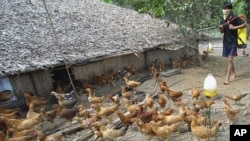PHNOM PENH —
Two siblings from Kratie province have died from bird flu, the first cases in the country for 2014, health officials confirmed Wednesday.
The boy, 8, and girl, 2, were brought to the Kampong Cham provincial hospital on Feb. 7, after falling ill with fever, sore throat and runny nose on Jan. 31, the Ministry of Health and World Health Organization said. They died in the hospital on the same day.
About 350 birds died from the H5N1 virus, also known as avian influenza, in their home village in mid-January, officials said. The children had contact with dead birds that were being prepared for cooking.
Sok Touch, head of the Ministry of Health’s communicable disease department, said the boy tested positive for the H5N1 virus, but his sister perished before she could be tested.
Cambodia has seen 49 confirmed deaths from bird flu since 2005, with the majority of them children below the age of 14. Last year alone saw the deaths of 12 Cambodians from the virus.
In a statement, Health Minister Mam Bunheng urged people to wash hands thoroughly and often after contact with poultry and not to eat sick or already dead poultry.
The boy, 8, and girl, 2, were brought to the Kampong Cham provincial hospital on Feb. 7, after falling ill with fever, sore throat and runny nose on Jan. 31, the Ministry of Health and World Health Organization said. They died in the hospital on the same day.
About 350 birds died from the H5N1 virus, also known as avian influenza, in their home village in mid-January, officials said. The children had contact with dead birds that were being prepared for cooking.
Sok Touch, head of the Ministry of Health’s communicable disease department, said the boy tested positive for the H5N1 virus, but his sister perished before she could be tested.
Cambodia has seen 49 confirmed deaths from bird flu since 2005, with the majority of them children below the age of 14. Last year alone saw the deaths of 12 Cambodians from the virus.
In a statement, Health Minister Mam Bunheng urged people to wash hands thoroughly and often after contact with poultry and not to eat sick or already dead poultry.







